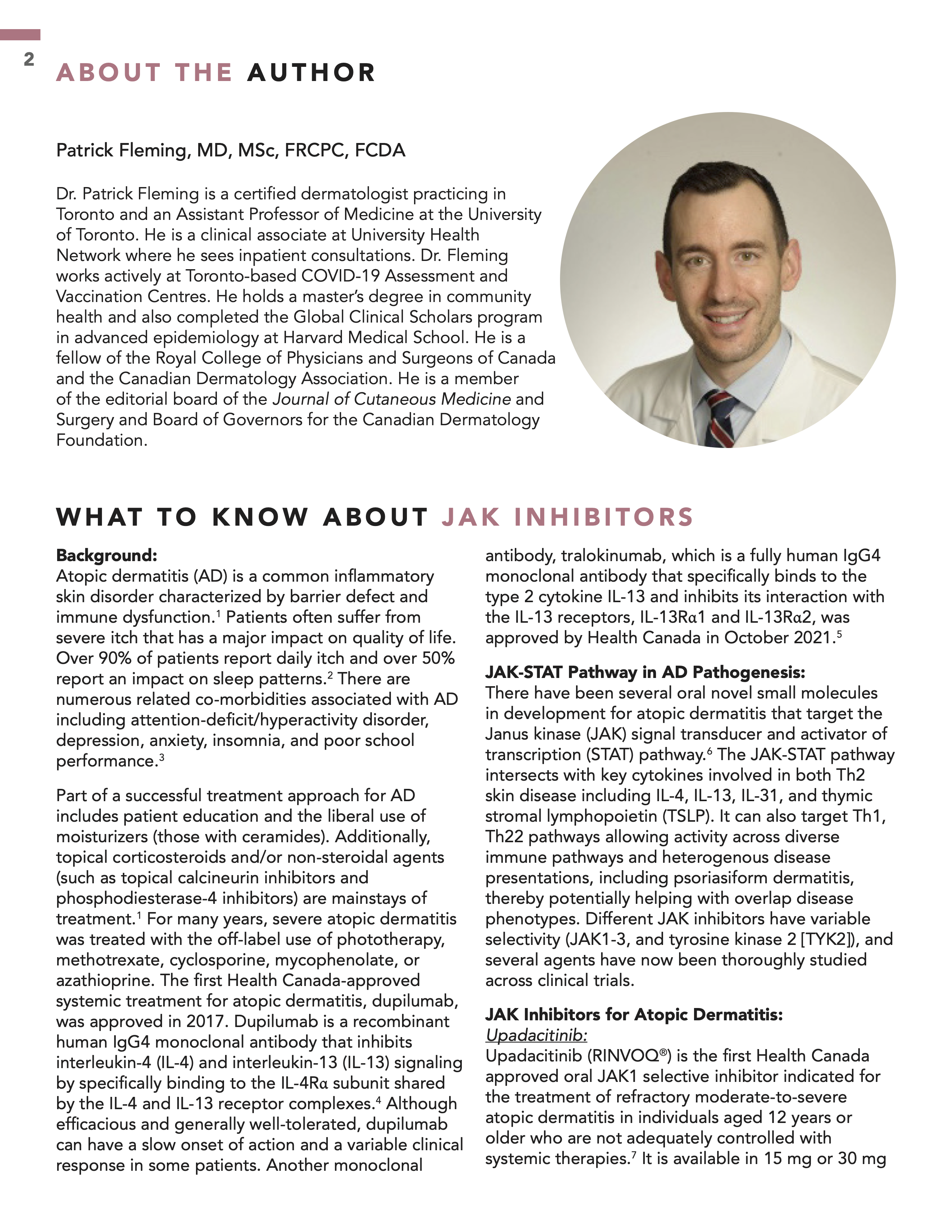What to know about JAK inhibitors
Abstract
Atopic dermatitis (AD) is a common inflammatory skin disorder characterized by barrier defect and immune dysfunction. Patients often suffer from severe itch that has a major impact on quality of life. Over 90% of patients report daily itch and over 50% report an impact on sleep patterns. There are numerous related co-morbidities associated with AD including attention-deficit/hyperactivity disorder, depression, anxiety, insomnia, and poor school performance.
Part of a successful treatment approach for AD includes patient education and the liberal use of moisturizers (those with ceramides). Additionally, topical corticosteroids and/or non-steroidal agents (such as topical calcineurin inhibitors and phosphodiesterase-4 inhibitors) are mainstays of treatment. For many years, severe atopic dermatitis was treated with the off-label use of phototherapy, methotrexate, cyclosporine, mycophenolate, or azathioprine. The first Health Canada-approved systemic treatment for atopic dermatitis, dupilumab, was approved in 2017. Dupilumab is a recombinant human IgG4 monoclonal antibody that inhibits interleukin-4 (IL-4) and interleukin-13 (IL-13) signaling by specifically binding to the IL-4Rα subunit shared by the IL-4 and IL-13 receptor complexes. Although efficacious and generally well-tolerated, dupilumab can have a slow onset of action and a variable clinical response in some patients. Another monoclonal antibody, tralokinumab, which is a fully human IgG4 monoclonal antibody that specifically binds to the type 2 cytokine IL-13 and inhibits its interaction with the IL-13 receptors, IL-13Rα1 and IL-13Rα2, was approved by Health Canada in October 2021.
References
Xeljanz. Product Monograph. https://www.pfizer.ca/sites/default/files/202206/Xeljanz_PM_EN_258173_09-May-2022.pdf. Accessed June 6, 2022.
Virtanen AT, Haikarainen T, Raivola J, Silvennoinen O. Selective JAKinibs: prospects in inflammatory and autoimmune diseases. BioDrugs. 2019 Feb;33(1):15-32.
Damsky W, Peterson D, Ramseier J, Al-Bawardy B, Chun H, et al. The emerging role of janus kinase inhibitors in the treatment of autoimmune and inflammatory diseases. J Allergy Clin Immunol. 2021 Mar;147(3):814-826.
RINVOQ Canadian Product Monograph, Jan 27, 2022.
CIBINQO Canadian Product Monograph, Jun 28, 2022.
Wood H, Chandler A, Nezamololama N, Papp K, Gooderham MJ. Safety of Janus kinase (JAK) inhibitors in the short-term treatment of atopic dermatitis. Int J Dermatol. 2022 Jun;61(6):746-754.
Mendes-Bastos et al. J Am Acad Dermatol. 2022 Jun 15; S0190-9622(22)00996-3. Online ahead of print.
Guttman-Yassky E, Teixeira HD, Simpson EL, Papp KA, Pangan AL, Blauvelt A, et al. Once-daily upadacitinib versus placebo in adolescents and adults with moderate-to-severe atopic dermatitis (Measure Up 1 and Measure Up 2): results from two replicate double-blind, randomised controlled phase 3 trials. Lancet. 2021;397(10290):2151-68.
Simpson EL, Papp KA, Blauvelt A, Chu CY, Hong CH, et al. Efficacy and safety of upadacitinib in patients with moderate to severe atopic dermatitis: Analysis of follow-up data from the Measure Up 1 and Measure Up 2 randomized clinical trials. JAMA Dermatol. 2022;158(4):404-413.
Simpson EL, Silverberg JI, Nosbaum A, Winthrop KL, Guttman-Yassky E, et al. Integrated Safety Analysis of Abrocitinib for the Treatment of Moderate-to-Severe Atopic Dermatitis From the Phase II and Phase III Clinical Trial Program. Am J Clin Dermatol. 2021;22(5):693-707.
Bieber T, Thyssen JP, Reich K, Simpson EL, Katoh N, et al. Pooled safety analysis of baricitinib in adult patients with atopic dermatitis from 8 randomized clinical trials. J Eur Acad Dermatol Venereol. 2021 Feb;35(2):476-485.
King B, Maari C, Lain E, Silverberg JI, Issa M, et al. Extended safety analysis of baricitinib 2 mg in adult patients with atopic dermatitis: an integrated analysis from eight randomized clinical trials. Am J Clin Dermatol. 2021 May;22(3):395-405.
Rinvoq. Product Monograph. https://www.abbvie.ca/content/dam/abbvie-dotcom/ca/en/documents/products/RINVOQ_PM_EN.pdf. Accessed June 7, 2022.


